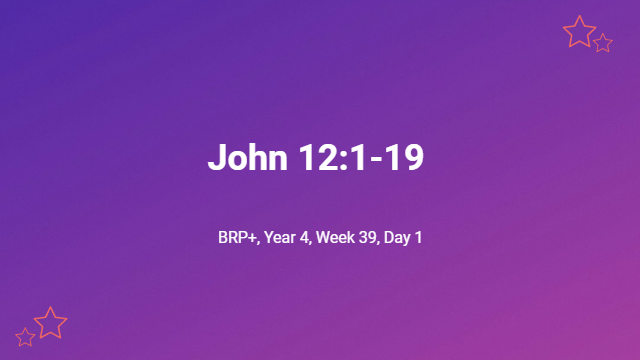John 12:1-19
Q.1. Why was Judas critical of Mary’s expression of love for Jesus? What perspective did Jesus have about such extravagance? – (Jn.12:1-8)
John now focuses on the last six days of Jesus’s life before dying in the place of the slaying of the Passover lamb (see Jn.12:1 c.f. Jn.19:14 & 31). Martha, Lazarus, and Mary provided the perfect home where Jesus could relax (see Jn.12:1-2). There was a special bond between all of them. Lazarus enjoyed the company of Jesus and the disciples. Jesus was preparing them for His God directed mission to a lost world. Martha, with her rock-solid faith (see Jn.11:27), again provided refreshments as only she could do. Mary loved Her Saviour deeply. This love inspired the most extravagant devotion – Mary then took a pound of very costly perfume of pure nard and anointed the feet of Jesus and wiped His feet with her hair; and the house was filled with the fragrance of the perfume (see Jn.12:3). Judas in no way shared this devotion. He couched his frustration with a pretended concern for the poor who may have benefitted from the sale of the precious perfume. However, this was a cloak for his less than honest ideas for using the money (see Jn.12:4-6). Mary had been sensitive to Christ’s nearing crisis as the cross drew near. She had kept this lavish gift for Jesus and what He would encounter in His death. Jesus defended the devotion of Mary and told of the highest motivation behind her act – 7 … “Leave her alone, so that she may keep it for the day of My burial. 8 For you always have the poor, but you do not always have Me” (Jn.12:8-9). Mary had lavished her love on Christ when He most needed it.
Q.2. Why did the religious leaders place a death sentence on Lazarus? How did the crowds react to the signs Jesus gave? Why did the Pharisees want to kill Jesus? – (Jn.12:9-11 & 17-19)
The miraculous resurrection of Lazarus at the hands of Jesus meant that he had become the focal point of the adoring crowds (see Jn.12:9). However, he had also become a target for the chief priests – because on account of him many of the Jews were going away and were believing in Jesus (Jn.12:10-11). Both those who had witnessed the resurrection, and those who had believed the reports saw this as a sign that Jesus was more than just a man. Tragically, the biased Pharisees could only ruefully conclude – …”You see that you are not doing any good; look, the world has gone after Him” (Jn12:19). This necessitated more drastic action by these enemies of Jesus.
Q.3. What did Jesus mean to convey with His entry into Jerusalem on a donkey? What did the crowds make of Christ’s entry? When did the disciples understand Christ’s actions? – (Jn.12:12-19)
Jesus knew that His Messiahship was officially rejected by the religious leaders. Nevertheless, He offered Himself as Israel’s King, as prophesied by the Scriptures, by entering Jerusalem on an unbroken donkey – “Fear not, daughter of Zion; behold, your King is coming, seated on a donkey’s colt” (Jn.12:15). The crowds were swept into a frenzy, as they – took the branches of the palm trees and went out to meet Him, and began to shout, “Hosanna! Blessed is He who comes in the name of the Lord, even the King of Israel” (Jn.12:13). However, most of the significance of what was happening was lost on the crowds. John reported – These things His disciples did not understand at the first; but when Jesus was glorified, then they remembered that these things were written of Him, and that they had done these things to Him (Jn.12:16). It would be a turning point in the nation’s history – 37 “Jerusalem, Jerusalem, who kills the prophets and stones those who are sent to her! How often I wanted to gather your children together, the way a hen gathers her chicks under her wings, and you were unwilling. 38 Behold, your house is being left to you desolate! 39 For I say to you, from now on you will not see Me until you say, `Blessed is He who comes in the name of the Lord!'” (Mt.23:37-39).

